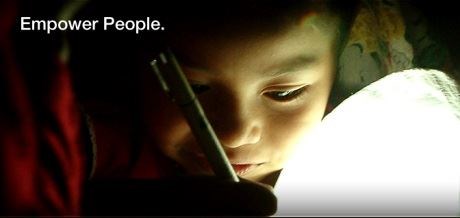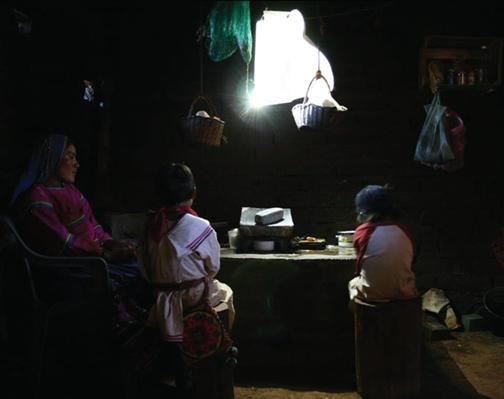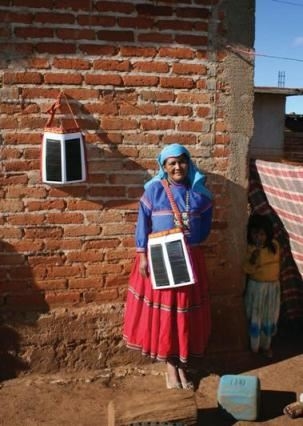 |
The Portable Light Project is empowering the developing world by powering up its citizens with portable sun-generated light.
Specifically, the Portable Light Project developed a flexible, solar, nano-technology textile kit that people can weave or sew into clothing, bags, blankets, and other items. During the day, as they are worn or used, the photovoltaics woven into these items harvest the sun’s energy which, at night, will turn them into sources of light.
For the two billion, mostly impoverished, people living in regions without electricity, having personal sources of light available after sunset can mean a dramatically improved standard of living.
These light sources afford citizens the ability to work and study at night, a convenience taken for granted in developed nations where restaurants, stores, hospitals, and universities stay open well after sunset, and children do homework and even read in bed. To a child in the developing world, the simple act of reading their school books at home can be life-changing!
These portable textiles provide surprisingly bright, white light that can be used both at home and throughout the community, at businesses, health and educational centers, and even while walking down dark roads.
Each textile also generates enough electrical power to charge small electronic devices like cell phones.
Linked portable units work together even better as a group through digital communication protocols. Likewise, though families can enjoy using individual units, when networked with other units, they can create energy for cooperative community projects.
 |
| In the kitchen, a Huichol family gathers around the table with a Portable Light Unit hung from above. Photo credit: Kennedy & Violich Architecture, LTD. |
Although larger solar panels can bring vast improvements to communities, they are expensive even by western standards, large and difficult to transport, and disappointingly fragile.
Additionally, for nomadic peoples, the permanence of these fixtures is clearly not conducive to their traditional way of life.
In comparison, the Portable Light units are remarkably versatile offering both portable and semi-permanent lighting that can be customized according to a community’s needs and traditions.
Because the textile can be woven in to otherwise typical, regularly used items, Portable Light units are neither cumbersome nor culturally improper. This is particularly important for women, who are characteristically the most marginalized members of society.
Likewise, unlike other types of modern technological advancements, Portable Light units allow for easier integration into rural and nomadic societies.
In fact, the project, created by staff and students at the University of Michigan, began with the semi-nomadic Huichol people of Mexico’s Sierra Madre Mountains. While life has modernized around them, these people have maintained their culture and life style for hundreds of years.
To function within their nomadic lifestyle, the Huichol have woven the textile into traditional bags they carry by day, affording them with personal light sources at night, yet not interfering with their traditional way of life.
 |
| Estella Hernandez wears her Portable Light Unit integrated into a traditional Huichol carry bag while another charges on the wall. Photo credit: Kennedy & Violich Architecture, LTD. |
The Portable Light Project has since expanded their global reach.
In Nicaragua, the team is working with Paso Pacifico to help villagers protect biodiversity. The portable light textiles will allow for much needed employment in isolated areas where endangered turtles come to lay their eggs, while not disturbing the turtles with bolder light sources.
The team is also venturing into the Sierra, to help women in Las Guayabas weave the textile into their traditional bags, and document their stories.
Working with iTEACH and the Massachusetts General Hospital, the Portable Light Project is also working in Zwa-Zulu, South Africa to provide solar light blankets to rural patients suffering from HIV and drug-resistant tuberculosis, both leading causes of death in the region.
iTEACH is developing a home care kit for TB patients, to help those who cannot go to the hospital for treatment. Working along with this, the Portable Light iTEACH blankets provide a variety of beneficial elements to these patients, literally allowing them to power their own treatment.
The blankets provide much-needed warmth to impoverished patients who can benefit from the sun’s sterilizing UV rays during the day but would likely be too cold to go out otherwise. While patients are exposed to the sunshine, in only three hours, the blankets are simultaneously charged and energy is stored in the rechargeable battery which at night provides 8 hours of bright white light to their homes, along with the detachable textile-integrated LED lantern patients are also provided with. This light allows their families to treat them after dark, a necessary part of their treatment regimen.
 |
Most recently the prestigious Tech Awards selected the Portable Light Project as a 2008 Laureate for the Accenture Economic Development.
The Portable Light Project has created a revolutionary approach to lighting the developing world that can succeed where larger, substantially more expensive projects have failed. The textiles are easy to ship, durable, and portable, three key factors to their continued success and integration.
This ‘off the grid’ form of portable energy is quite literally -- and figuratively -- empowering the developing world. Fortunately for those who could so greatly benefit from these portable light sources, like the clever textiles they design, the Portable Light Project shows no sign of running out of energy.
Page created on 12/23/2008 8:37:14 AM
Last edited 12/23/2008 8:37:14 AM
